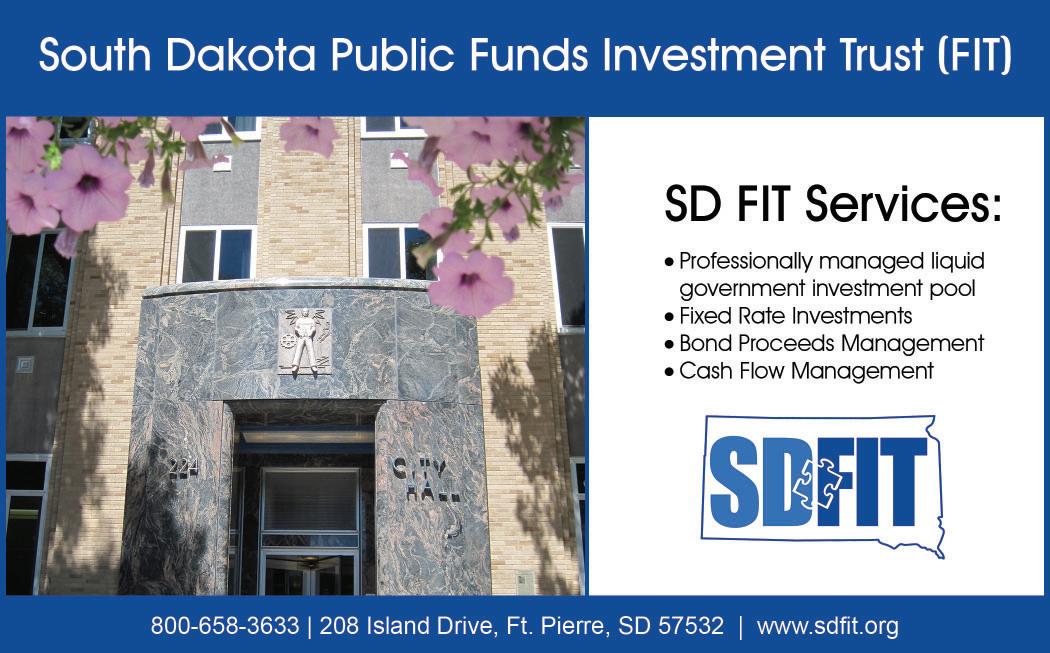
8 minute read
Recreation Grants: A Tale of Two Cities
RANDY KITTLE, RTP AND LWCF GRANTS COORDINATOR
The days are starting to get longer, and our interests are starting to shift more toward outdoor activities, warm sunny days, and enjoyable experiences with family and friends at the park. This also means time for city staff to think about improvement projects needed for parks and trails as well as development of new park areas for growing cities.
Advertisement
Two federal grant programs currently accepting applications can help you fund these trail and park projects: the Recreational Trails Program and Land and Water Conservation Fund. Administered by the South Dakota Department of Game, Fish and Parks, these grants provide assistance for trail and park projects across the state.
The Recreational Trails Program (RTP) provides grant assistance for trail development and nonroutine maintenance. These grant dollars come to the State through the Federal Highway Administration and provide up to 80% of the approved project cost in the form of a reimbursement. Eligible applicants include private and non-profit organizations, municipal agencies, state agencies, federal agencies, and tribal governments. Projects need to provide a public benefit and should fall into the following categories: Trail maintenance and Restoration, Trailside and Trailhead Facilities, Trail Construction Equipment, New Recreational Trail Construction, Land Acquisition/ Easement for Trail Construction, Trail Accessibility Assessment, and Educational Programs. Under RTP, funding is required to be awarded to projects in accordance with the following formula: 30% funding to motorized trail projects, 30% funding goes to non-motorized trail projects and 40% goes to diversifi ed trail projects. The application for RTP grants closes April 8, 2022. The grant manual and application are available at: gfp.sd.gov/partnerships.
The Land and Water Conservation Fund (LWCF) provides grant assistance for public outdoor recreation. These grant dollars come to the State through the National Park Service and will provide up to 50% of the approved project cost in the form of a reimbursement. Eligible applicants include city, county and township governments, tribal governments, and the State. The Statewide Comprehensive Outdoor Recreation Plan (SCORP) identifi es strategies and priority projects eligible for grant assistance. Some examples of projects that have been funded include swimming pool/splash pad projects, playgrounds, pickleball courts, basketball courts, baseball/ softball fields, picnic facilities, campgrounds, landscaping for the project area, park roads, fencing, lighting. The application period for LWCF grants closes April 29, 2022. The grant manual, application, and SCORP are available at gfp.sd.gov/ partnerships.

Kuhnert Arboretum, Aberdeen, and Harbach Centennial Park, Custer, are being revitalized with assistance from grants through the Recreational Trails Program and Land and Water Conservation Fund.
KUHNERT ARBORETUM, ABERDEEN
Numerous cities across the state have participated in these two grant programs throughout their history. Often, these grants are used to create a new park space, like the new Kuhnert Arboretum in the City of Aberdeen.
The City purchased the property in 1974 and dedicated it Kuhnert Arboretum in honor of Ervin Kuhnert, long-time city park superintendent. In the earlier years of the arboretum, trees were planted, and the area was maintained for public use. In the 1990s, disc golf was introduced to the area. Since then, the city has made improvements including a paved trail, paved parking area, children’s garden, music instruments, nature play area, and pollinator plot. A playground will be installed in 2022.
“Public use of the Kuhnert Arboretum has increased 10-fold since the City of Aberdeen, Parks, Recreation and Forestry Department started making improvements to the park,” said Aaron Kiesz, City Foerster for the City of Aberdeen. “In 2015, the fi rst established trails were installed in the arboretum. This made access into the park much easier as the new trails connect to the existing trail system that runs throughout the community.
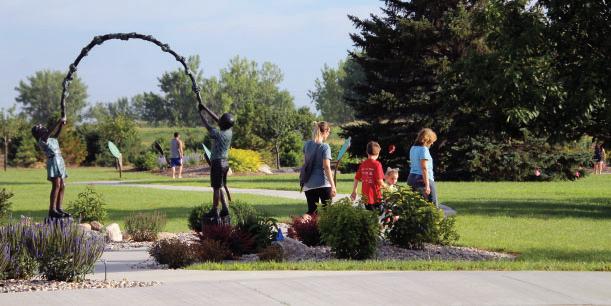
“Every year, more people learn about the area and begin using it for leisure,” Kiesz added. “Special events such as weddings bring new attention to the park, and we always see an uptick in use after these events. With the addition of other garden beds, rose beds and features, there are more and more opportunities for people with various interests.”
The city successfully used both grant programs to make development of the arboretum successful. In 2014 and 2018, the city applied for and was awarded grant assistance through the Recreational Trails Program that allowed them to construct a paved trail in the arboretum. Later this year, new playground equipment will be installed thanks to a grant through the 2021 Land and Water Conservation Fund cycle.
The city’s on-going investments in the arboretum are paying off as Kuhnert Arboretum is developed into another city park area offering recreational and educational opportunities for park users.
“Without the access to the grant funding, much of what has been
Kuhnert Arboretum, Aberdeen
KUHNERT ARBORETUM | MASTER PLAN AND CONCEPTUAL DEVELOPMENT
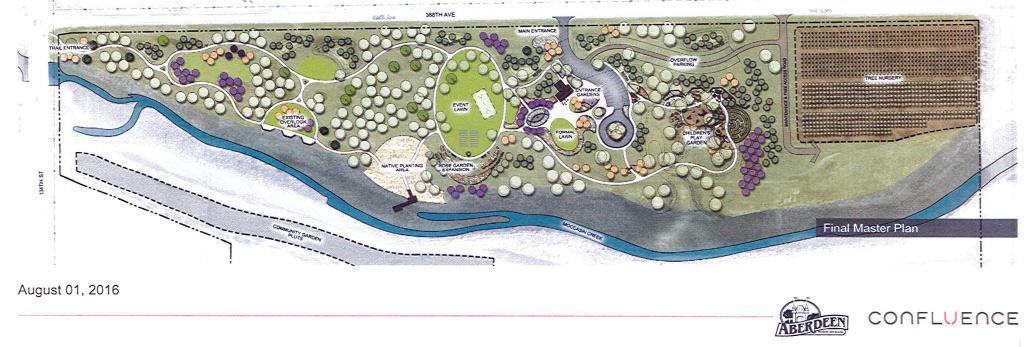
done at the arboretum or for that matter within our park system would have been delayed and not done for a number of years,” said Mark Hoven, Director of Parks, Recreation and Forestry for the City of Aberdeen. “LWCF funding is a critical part of planning for our system and vitally important funding for moving projects ahead.”
HARBACH PARK, CUSTER
The grants not only aid in creating new facilities, but also help replace what was lost.
Harbach Park in the City of Custer suffered signifi cant damage when an August 2019 fl ash fl ood swelled adjacent French Creek and signifi cantly damaged park facilities. Established around 1950, the park had been providing public access to the picnic areas, playground, and open green space for decades. Rather than simply replace what was lost, city offi cials looked at ways they could make Harbach a better park for the community going into the future. A master plan for the park was developed and grant assistance was sought for several different elements included in the Harbach Master Plan effort.
“In short, the grant funds have helped physical construction come to fruition in an expedited timeframe,” said Tim Hartman, Planning Administrator for the City of Custer. “Within the community of Custer, we have multiple public improvement projects on the ‘docket’ and prioritizing and funding all of those projects can be challenging. The grant funds have helped lighten the cost for improvements and thus make the first few phases of a master plan a reality.”
Like Aberdeen, the City of Custer was able to utilize both RTP and LWCF grants to aid in Harbach Park’s reconstruction. LWCF grant assistance was awarded to replace the playground equipment, replace the damaged pedestrian bridge, reconfi gure parking, and construct a new picnic shelter. RTP grant assistance was awarded to realign the George S. Mickelson Trail as it crosses 6th Street, moving the street crossing from a mid-block crossing to a much safer crossing at the intersection. Additionally, the parking lot at the Mickelson Trail trailhead will be improved to better serve trail and park users. These projects will be happening in 2022 to provide an updated Harbach Park for the recreating public.
“Harbach Park is a central hub to so many users within the community,” said Hartman. “Being a key stopping point along the Mickelson trail, a primary trailhead for Custer’s Big Rock Park hiking trails, a centrally located City Park for family’s looking to picnic or enjoy a nice afternoon outdoors, and a complimentary open space for different community events along Washington Street, the planned improvements will provide great updates for all of these users.
HARBACH PARK | CONCEPTUAL DEVELOPMENT
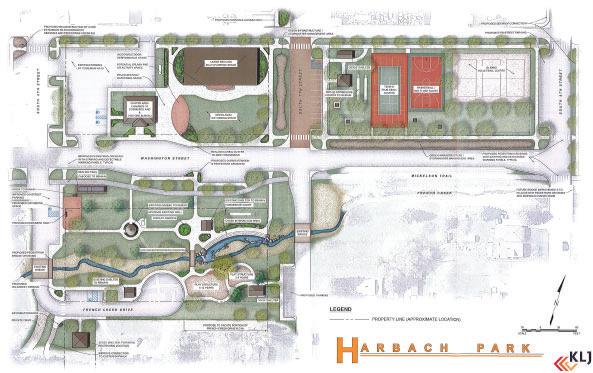
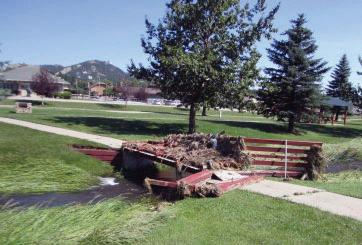
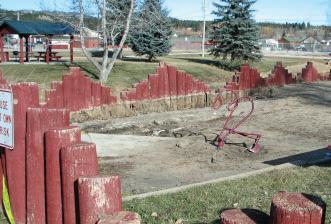
Harbach Park in Custer suffered signifi cant damage following an Aug. 2019 fl ash fl ood. The city applied for and received federal recreation grant funds which will be used to restore and revitalize the beloved park.
“The planned improvements are two initial phases for a large ‘Harbach Park Master Plan.’ We hope these improvements will be the initial steps needed to get the ball rolling as we continue to bring that master plan to fruition in the years to come.”
Interestingly, this isn’t the first time the City of Custer has used these grant funds. The playground equipment lost in the flood was originally purchased with LWCF grant assistance in the 1990s.
This provides a great example of how a city can use LWCF grant assistance to keep their park facilities safe and inviting for the public throughout the years.
We all know that parks don’t stay new for long, but you can keep them from getting old with proper planning and assistance from grants like these. APPLYING FOR RECREATION GRANTS
The RTP grant application window is open until April 8, 2022. The LWCF grant application window is open until April 29, 2022. Now is a great time to look at park and trail improvement opportunities in your community. Assistance from these programs can help complete your projects while stretching your city budget, accomplishing more for your residents.
If you have a potentially eligible project for either of these grants, keep these tips in mind: • Identify the scope of the project.
Is the project eligible for funding under the grant program? • Get written estimates from contractors and vendors that specialize in this type of project. • Be able to provide proof of ownership or permission to construct a trail on the property. • Get the local matching funds in place. • Don’t wait until the last minute to complete the application. • Submit the best quality grant application to present your proposal in the best possible manner. • If you are selected to receive grant assistance, be ready to begin the project as soon as you are given the offi cial notice to proceed. • Don’t be afraid to ask questions about grants, potential projects, and projects selected for grant assistance. ■
For additional information on either of these grant programs, contact the author and Grant Coordinator Randy Kittle by phone at (605)7735490 or by e-mail at randy.kittle@ state.sd.us.
